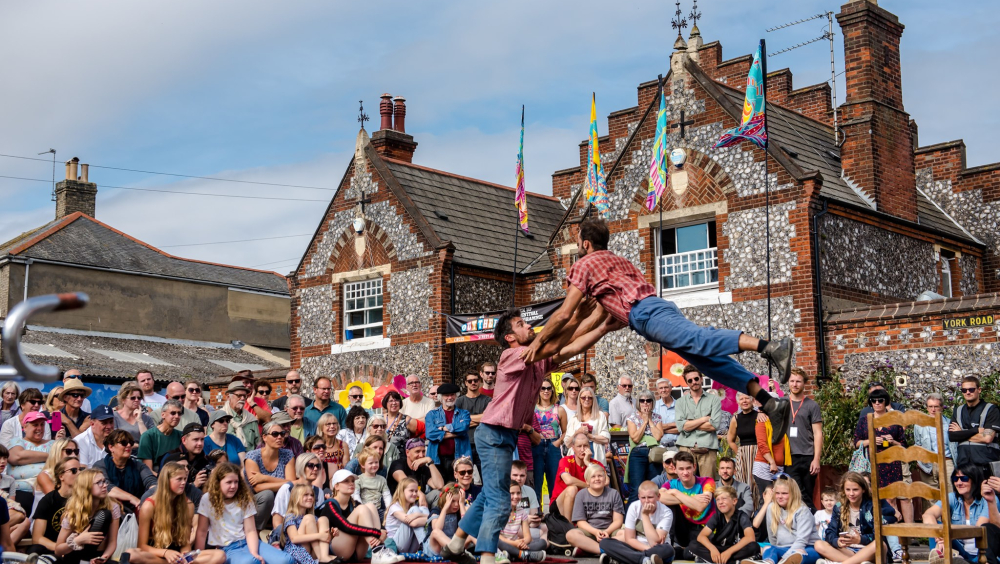'Little Portugal' Street Party - Celebrating Great Yarmouth's Migrant History
This is the story of the transformation of the historic ‘King Street’ area of Great Yarmouth through the arrival and growth of Portuguese migrant workers over the last 20+ years, resulting primarily from the direct recruitment in Portugal for Bernard Matthew Turkey Factories. The result is a completely unique neighbourhood, an unusual tale of regeneration in one of the most deprived areas of the UK, and collection of amazing stories of people and place in this space and time.
Great Yarmouth was once a glorious wealthy medieval fishing town, then a thriving Victorian/Edwardian tourism destination, then post wars and package holidays its hard times and faded glory like many seaside towns. By the early 1990s it was in serious need of regeneration and parts of what was once a stunning historic town centre looked more like boarded up deserted streets of a warzone. King street especially – the historic principle street of the town in the middle of the original medieval street plan of ‘rows’ and alleyways packed with listed buildings spanning centuries, was all but abandoned. Also in the mid 90’s the UK opened its labour markets to the EU. Agricultural belt Norfolk found it could suddenly pull on a new pool of EU migrant workers to fill the staffing gaps it was finding harder and harder to do with domestic labour. And the most iconic of all Norfolk farm produce – BOOOOOOtiful Bernard Matthew Turkeys – went further than most, setting up recruitment agencies in Portugal itself. In Portugal where the economy was flat, unemployment high and wages very very low, the prospect of working abroad was well-sold. Prospective workers were told they would be given accommodation in a beautiful town on the coast, guaranteed work and wages and free transportation from their coastal paradise to the sparkling factories around the area every day. Many thousands signed up for this. Many were shocked by the reality of the conditions they found – both in their work and also in their now home town of Great Yarmouth where they were housed in their thousands, largely in the central Nelson ward area of the town – the 20th most deprived neighbourhood of 35,000 in England. For may the experience was short term – one of gathering cash and then returning to the warmth and cultural familiarity of Portugal. But many also stayed and over 20+ years have transformed this area into the most extraordinary ‘little Portugal’. The shops, bars, restaurants and cafes that were all boarded up are now ALL FULL of Portuguese businesses and clientele. These entrepreneurial end users have opened the doors to public heritage money restoring many of these historic buildings – an impossible task when the prospects of a viable end-user was nowhere in sight. And around this has grown a cultural diversity and internationalism unseen elsewhere in middle-class white bread Norfolk. Alongside the white Europeans of Portugal here is now a major black community from former Portuguese colony countries – Brazil, Mozambique, Angola, Senegal, Cape Verde. And a new artistic community from the neighbouring National Centre for Street Arts and Circus (SeaChange Arts). Its an extraordinary and beautiful mix. But of course with a twist. The Brexit vote (enormously high in this town) has been felt like a vote of unwantedness for these people. A sense of segregation and isolation is palatable. Visible daily racist abuse on the streets has grown since 2016. But here are families, new generations, people of such mixed and entwined cultures that call this place home. And those here for decades who still feel home is somewhere else….
Since the 1950s and 1960s the Portuguese have settled and worked in the UK, only recently, in the past 20+ years, Great Yarmouth and the rest of East Anglia has become an important migration destination. We will examine migration motives and practice to the town and explore the multi-national nature of the Portuguese-speaking community that have helped shape and change the landscape and economy of Great Yarmouth. There are myriad challenges to community cohesion in Great Yarmouth brought through migration (including Portuguese, Eastern European communities) combined with ongoing deprivation; BAME population increase from 1.4% in 2001 to 3.2% in 2011, Borough Profile 2017; Nelson Ward is in top 5% Index of Multiple Deprivation nationally and the 20th most deprived LSOA in England. We’ve identified many local issues around social cohesion that require attention: - Growing community tensions; issues around neighbourhood identity in ‘Little Portugal’; - potential to unlock this through generating and harnessing ‘Latin vibrancy’ and diversity in this deprived area - Very visible young black international community (from Cape Verde, Angola, Mozambique, Brazil) and thinly veiled resentment from the white community of ‘them’ - Large migrant community predominantly come from lower socio-economic backgrounds, little cultural engagement - A demographic and engagement ‘dip’ amongst older young people (16-30) - People here work hard and have hard lives and there’s a deficit of dynamic community leaders making things happen - Skilled / higher wage earners working in the town are disproportionately not resident SeaChange has a role to play providing opportunities for diverse communities, through the sense of connection from engagement in circus and participatory arts.
